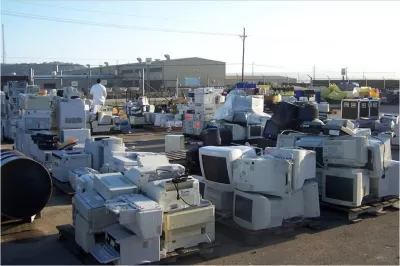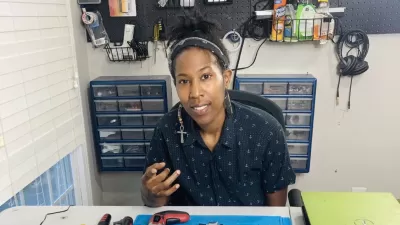When a watchdog group partnered with MIT to install trackers on a batch of e-waste, the results were sobering. Much of the haul left the country, ending up in Asian junkyards where unknowing workers are exposed to toxic substances.

Some hard facts, usually overlooked: "Dead electronics make up the world's fastest growing source of waste. The U.S. produces more e-waste than any country in the world. Electronics contain toxic materials like lead and mercury, which can harm the environment and people. Americans send about 50,000 dump trucks worth of electronics to recyclers each year."
This story for KUOW covers Seattle activist Jim Puckett, whose Basel Action Network recently "partnered with the Massachusetts Institute of Technology to put 200 geolocating tracking devices inside old computers, TVs and printers." The organization has released a video about the project.
According to Puckett's findings, many so-called recyclers in the United States are in fact exporters who don't care about what happens on the other end. "In a bear market for commodities, exporting waste is more profitable than processing it domestically. Recyclers simply fill a shipping container with whole electronics, and an e-waste broker arranges for pick-up."
In some cases, the conditions in developing world junkyards are deplorable. From the article: "Villagers desoldered circuit boards over coal-fired grills, burned plastic casings off wires to extract copper, and mined gold by soaking computer chips in black pools of hydrochloric acid."
Puckett's organization is named after the Basel Convention, an international treaty to prevent developed nations from dumping hazardous waste elsewhere in the world. The United States has not ratified the treaty, nor does it have any federal laws banning e-waste exports.
Of course, not all recyclers are engaging in this problematic activity: "Over the years Puckett's attempts to quantify and draw attention to exported electronic waste has drawn criticism from U.S. recyclers who say the problem has been exaggerated." But enough is going on to justify considerable environmental and human rights concerns.
FULL STORY: On the trail of America's dangerous, dead electronics

Planetizen Federal Action Tracker
A weekly monitor of how Trump’s orders and actions are impacting planners and planning in America.

Maui's Vacation Rental Debate Turns Ugly
Verbal attacks, misinformation campaigns and fistfights plague a high-stakes debate to convert thousands of vacation rentals into long-term housing.

San Francisco Suspends Traffic Calming Amidst Record Deaths
Citing “a challenging fiscal landscape,” the city will cease the program on the heels of 42 traffic deaths, including 24 pedestrians.

Amtrak Rolls Out New Orleans to Alabama “Mardi Gras” Train
The new service will operate morning and evening departures between Mobile and New Orleans.

The Subversive Car-Free Guide to Trump's Great American Road Trip
Car-free ways to access Chicagoland’s best tourist attractions.

San Antonio and Austin are Fusing Into one Massive Megaregion
The region spanning the two central Texas cities is growing fast, posing challenges for local infrastructure and water supplies.
Urban Design for Planners 1: Software Tools
This six-course series explores essential urban design concepts using open source software and equips planners with the tools they need to participate fully in the urban design process.
Planning for Universal Design
Learn the tools for implementing Universal Design in planning regulations.
Heyer Gruel & Associates PA
JM Goldson LLC
Custer County Colorado
City of Camden Redevelopment Agency
City of Astoria
Transportation Research & Education Center (TREC) at Portland State University
Jefferson Parish Government
Camden Redevelopment Agency
City of Claremont





























